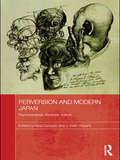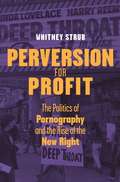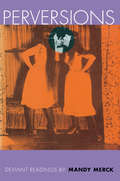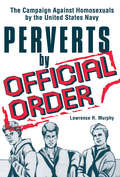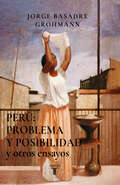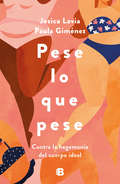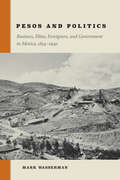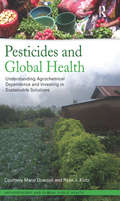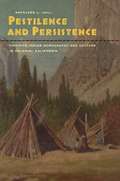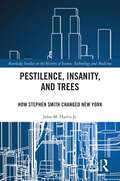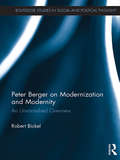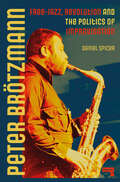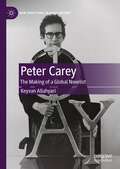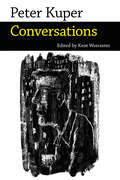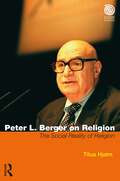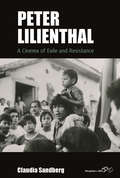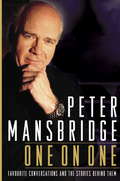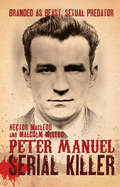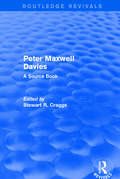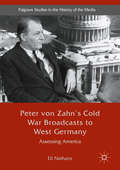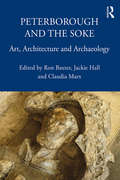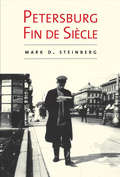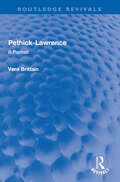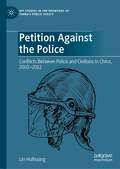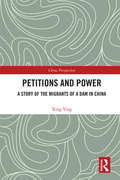- Table View
- List View
Perversion and Modern Japan: Psychoanalysis, Literature, Culture (Routledge Contemporary Japan Series)
by Nina CornyetzHow did nerves and neuroses take the place of ghosts and spirits in Meiji Japan? How does Natsume Soseki’s canonical novel Kokoro pervert the Freudian teleology of sexual development? What do we make of Jacques Lacan’s infamous claim that because of the nature of their language the Japanese people were unanalyzable? And how are we to understand the re-awakening of collective memory occasioned by the sudden appearance of a Japanese Imperial soldier stumbling out of the jungle in Guam in 1972? In addressing these and other questions, the essays collected here theorize the relation of unconscious fantasy and perversion to discourses of nation, identity, and history in Japan. Against a tradition that claims that Freud’s method, as a Western discourse, makes a bad ‘fit’with Japan, this volume argues that psychoanalytic reading offers valuable insights into the ways in which ‘Japan’ itself continues to function as a psychic object. By reading a variety of cultural productions as symptomatic elaborations of unconscious and symbolic processes rather than as indexes to cultural truths, the authors combat the truisms of modernization theory and the seductive pull of culturalism. This volume also offers a much needed psychoanalytic alternative to the area studies convention that reads narratives of all sorts as "windows" offering insights into a fetishized Japanese culture. As such, it will be of huge interest to students and scholars of Japanese literature, history, culture, and psychoanalysis more generally.
Perversion for Profit: The Politics of Pornography and the Rise of the New Right
by Whitney StrubWhile America is not alone in its ambivalence toward sex and its depictions, the preferences of the nation swing sharply between toleration and censure. This pattern has grown even more pronounced since the 1960s, with the emergence of the New Right and its attack on the "floodtide of filth" that was supposedly sweeping the nation. Antipornography campaigns became the New Right's political capital in the 1960s, laying the groundwork for the "family values" agenda that shifted the country to the right. Perversion for Profit traces the anatomy of this trend and the crucial function of pornography in constructing the New Right agenda, which has emphasized social issues over racial and economic inequality. Conducting his own extensive research, Whitney Strub vividly recreates the debates over obscenity that consumed members of the ACLU in the 1950s and revisits the deployment of obscenity charges against purveyors of gay erotica during the cold war, revealing the differing standards applied to heterosexual and homosexual pornography. He follows the rise of the influential Citizens for Decent Literature during the 1960s and the pivotal events that followed: the sexual revolution, feminist activism, the rise of the gay rights movement, the "porno chic" moment of the early 1970s, and resurgent Christian conservatism, which now shapes public policy far beyond the issue of sexual decency. Strub also examines the ways in which the left failed to mount a serious or sustained counterattack to the New Right's use of pornography as a political tool. As he demonstrates, this failure put the Democratic Party at the mercy of Republican rhetoric. In placing debates about pornography at the forefront of American postwar history, Strub revolutionizes our understanding of sex and American politics.
Perversions: Deviant Readings by Mandy Merck
by Mandy MerckIn this series of provocative essays on culture, art, and film, former Screen editor Mandy Merck explores the paradoxes of sexual representation. Whether writing on romantic fiction or hardcore pornography, on robots or sex goddesses, Radclyffe Hall or the Marquis de Sade, she finds the perversions and deviances. Illustrated.
Perverts by Official Order: The Campaign Against Homosexuals by the United States Navy
by Lawrence MurphyThis candid book documents for the first time the U.S. Navy’s use of entrapment in pursuit of homosexuals in and around Newport, Rhode Island, during the early twentieth century. This most extensive systematic persecution of gays in American history occurred with the approval of Navy Secretary Josephus Daniels and Assistant Secretary Franklin Roosevelt, as dozens of sailors were ordered to identify and even seduce gay men in order to report their names to the authorities. Noted historian Lawrence Murphy reveals the details of this sordid campaign that ultimately generated a national scandal and first raised issues of gay rights and governmental persecution of homosexuals.
Perú: problema y posibilidad y otros ensayos
by Jorge Basadre GrohmannA 91 años de su primera publicación, regresa Perú: problema y posibilidad y otros ensayos, una de las obras fundamentales de uno de los más destacados historiadores e intelectuales peruanos, Jorge Basadre. A 91 años de su primera publicación, regresa Perú: problema y posibilidad y otros ensayos, una de las obras fundamentales de uno de los más destacados historiadores e intelectuales peruanos, Jorge Basadre. Con una sólida madurez, en sus páginas se exponen las ideas capitales de su obra sobre el proceso histórico peruano, la realidad política y cultural del Perú, así como su preocupación por el transcurrir de nuestra sociedad. Reflexiona, de igual manera, sobre la lucha política y la evolución de las clases sociales durante la República. Sumado a ello, las páginas de Perú: problema y posibilidad y otros ensayos analizan las ideas y obras de grandes pensadores, políticos y artistas peruanos como Manuel González Prada, Augusto B. Leguía, José Carlos Mariátegui, José María Eguren, entre otros. Esta edición definitiva recoge los textos inéditos de la segunda edición de 1978 y 1992, y cuenta con el prólogo de la destacada historiadora Natalia Sobrevilla. Más vigente que nunca, sus páginas se convierten así en un crisol estimulante e imprescindible que alentará el debate público, e iluminará la senda de un país convulso hacia una sociedad más justa.
Pese lo que pese: Contra la hegemonía del cuerpo ideal
by Jesica Lavia Paula GiménezDesde una mirada feminista, Jesica Lavia, nutricionista, y Paula Giménez, periodista especializada en género, reflexionan sobre cómo el culto al "cuerpo ideal" y la obsesión por el peso despliegan dietas "milagrosas" e instalaron una "dictadura de la belleza" de la cual parece difícil escapar y cuyas víctimas principales y más visibles son las mujeres. «Queremos -dicen las autoras- que todas las feminidades podamos habitarnos un poco más amorosamente. Les hablamos a las gordas, las gorditas, las rellenitas, las flacas, las escuálidas, las petisas, las altas, las culonas, las caderonas, las tetonas y las chatas. A todas ellas y a nosotras mismas».
Pesos and Politics: Business, Elites, Foreigners, and Government in Mexico, 1854-1940
by Mark WassermanThe relationship between business and politics is crucial to understanding Mexican history, and Pesos and Politics explores this relationship from the mid-nineteenth century dictatorship of Porfirio Diaz through the Mexican Revolution (1876–1940). Historian Mark Wasserman argues that throughout this era, over the course of successive regimes, there was an evolving enterprise system that had to balance the interests of the Mexican national elite, state and local governments, large foreign corporations, and individual foreign entrepreneurs. During and after the Revolution these groups were joined by organized labor and organized peasants. Contrary to past assessments, Wasserman argues that no one of these groups was ever powerful enough to dominate another. Because Mexican governments and elites committed themselves to economic models that relied on foreign investment and technology, they had to reach a balance that simultaneously attracted foreign entrepreneurs, but did not allow them to become too powerful or too privileged. Concentrating on the three most important sectors of the Mexican economy: mining, agriculture, and railroads, and employing a series of case studies of the careers of prominent Mexican business people and the operations of large U.S.-owned ranching and mining companies, Wasserman effectively demonstrates that Mexicans in fact controlled their economy from the 1880s through 1940; foreigners did not exploit the country; and, Mexicans established, sometimes shakily, sometimes unplanned, a system of relations between foreigners, elite and government (and later unions and peasant organizations) that maintained checks and balances on all parties.
Pesticides and Global Health: Understanding Agrochemical Dependence and Investing in Sustainable Solutions (Anthropology and Global Public Health #1)
by Courtney Marie Dowdall Ryan J KlotzThis concise, accessible introduction to understanding agricultural chemicals and public health combines a broad synthesis on a global scale with rich ethnographic narratives on a human scale. Drawing on epidemiology, policy analysis, and social science research on the global commodity chain, the authors describe the system of global agrochemical dependence that constitutes a major threat to human health. Then they draw readers into the lush mountainsides of highland Guatemala, telling personal stories of farmers, their experiences with public health programs, their struggles against agrichemical dependence, and their innovations in sustainable agriculture. Finally, they show how this kind of qualitative, multi-level analysis holds practical lessons for public health. This engaging, brief text is an ideal supplement for courses in global health, introducing students to key concepts with broad coverage and engrossing ethnographic detail.
Pestilence and Persistence: Yosemite Indian Demography and Culture in Colonial California
by Kathleen L. HullThis innovative examination of the Yosemite Indian experience in California poses broad challenges to our understanding of the complex, destructive encounters that took place between colonists and native peoples across North America.
Pestilence, Insanity, and Trees: How Stephen Smith Changed New York (Routledge Studies in the History of Science, Technology and Medicine)
by John M. Harris Jr.This is the first full-length biography of New York surgeon and social activist Stephen Smith (1823–1922), who was appointed to fifty years of public service by three mayors, seven governors, and two U.S. presidents. The book presents the complex life of Stephen Smith, a consistent figure in the history of public health, mental health, housing reform in New York, and even urban reforestation. Utilizing Smith’s writings, public records, and recently discovered personal correspondence, this research shows how Smith succeeded where others failed. It also acknowledges that Smith was unsuccessful in convincing his fellow professionals to fight for a cabinet level public health department or to resist the rise of custodial care for the mentally impaired. Given Smith’s many accomplishments, the book asks us to consider if what stopped him stops us, highlighting the relevance of Smith’s story to contemporary debates. Pestilence, Insanity, and Trees is a readable and well-documented narrative and a resource for students and scholars, filling gaps in the history of American medicine, public health, mental health, and New York social reform.
Peter Berger on Modernization and Modernity: An Unvarnished Overview (Routledge Studies in Social and Political Thought)
by Robert BickelWith particular attention to his work on modernization and modernity as construed by a sociologist of knowledge, this book offers a sympathetic exposition and evaluation of Peter Berger’s work as one of the world’s most accomplished and influential sociologists. In the context of an examination of Berger’s ongoing work on the social construction of reality, styles of consciousness, the role of science-based technology, pluralism, and other pertinent topics, the author also considers Berger’s unique and thoughtful approach to research and theorizing. Berger’s method of ‘sociological tourism’, which departs sharply from the current emphasis in the social sciences on ever more complex and ostensibly rigorous statistical procedures, provides a refreshing move away from the increasingly esoteric and sometimes alienating methodological self-consciousness that characterizes contemporary sociology. With this distinctive approach, this book will appeal to scholars and students of sociology who share Berger’s interest. The importance of modernization and modernity on a world scale is undeniable, and a deeper understanding of their nature and consequences, will also benefit members of the intelligent laity who are not sociological specialists but are open to new ideas that are clearly explained.
Peter Brötzmann: Free-Jazz, Revolution and the Politics of Improvisation
by Daniel SpicerExplores the heroic life and revolutionary music of the pioneering German saxophonist, and the radical social and political convictions that informed them.Peter Brötzmann is the first ever, full-length, English-language biography of one of the most fascinating and inspiring personalities in the history of Western improvised music – and one of the key artistic figures to emerge from the socio-cultural tumult of the 1960s.Drawing on extensive interviews with Brötzmann and key associates, it traces the German saxophonist&’s crucial role as a pioneer of European free jazz, his restless travels and collaborations and his eventual superstardom, examining the life and work of a fiercely uncompromising artist with a reputation for gruff intensity and total commitment.Digging deep into the history and aesthetics of free jazz in Europe and beyond, it provides detailed analysis of music by Brötzmann and other major figures, while positioning Brötzmann&’s work – and the wider free jazz milieu – in the context of the revolutionary left-wing, humanist and utopian ideals that inspired and underpinned it.Both intimate and wide-ranging, it tells the story of a man and a music that changed the world.
Peter Carey: The Making of a Global Novelist (New Directions in Book History)
by Keyvan AllahyariPeter Carey: The Making of a Global Novelist recounts Peter Carey’s literary career from his emergence in the Australian literary scene as a contributor to local literary magazines to when he published his fiction exclusively with large conglomerate publishers. As Australia’s most decorated author for a period nearing half a century, Carey’s career gives unparalleled insights into the global contemporary publishing and the making of global literary prestige from the periphery, and significant cultural currency for Australian literature and culture worldwide. Carey’s fiction is not only a product of the global dynamic in literary publishing of the last quarter of the twentieth century, but also it holds something of its productive tension for Australian writing and writers. Allahyari retraces the fraught synthesis of an individual literary proclivity with a growing commercial cultural appetite: the coincidence of Carey’s career with the conglomeration of global publishing pushed further towards anti-elitist, popular aesthetics.
Peter Kuper: Conversations (Conversations with Comic Artists Series)
by Kent WorcesterPeter Kuper (b. 1958) is one of the country’s leading cartoonists. His artwork has graced the pages and covers of numerous newspapers and magazines, including Time, the New Yorker, Mother Jones, and the New York Times. He is a longtime contributor to Mad magazine, where he has been writing and drawing Spy vs. Spy for two decades, and the cofounder and coeditor of World War 3 Illustrated, the cutting-edge magazine devoted to political graphic art.Most of the interviews collected here are either previously unpublished or long out of print. They address such varied topics as world travels, teaching at Harvard, Hollywood deal-making, climate change, Spy vs. Spy, New York City in the 1970s and 1980s, and World War 3 Illustrated. Among the works examined are his books The System, Sticks and Stones, Stop Forgetting to Remember, Diario de Oaxaca, and adaptations of Franz Kafka’s The Metamorphosis and Upton Sinclair’s The Jungle. Kuper also discusses his graphic novel Ruins, which received the Eisner Award for Best New Graphic Novel in 2016.Along with two dozen images, this volume features ten lively, informative interviews as well as a quartet of revealing conversations, conducted in collaboration with Kuper’s fellow artist Seth Tobocman, with underground comix legends Robert Crumb and Vaughn Bodé, Mad magazine publisher William Gaines, and Jack Kirby.
Peter L. Berger on Religion: The Social Reality of Religion (Key Thinkers in the Study of Religion)
by Titus HjelmPeter L. Berger on Religion provides an overview and critical assessment of the work of one of the most influential sociologists of the 20th century.Situating Berger’s writings on religion and secularisation in the broader framework of social constructionism, the book argues that neither he nor the research influenced by him consistently followed the constructionist paradigm. This assessment is informed by a close examination of The Sacred Canopy (1967), in particular. The volume also offers a Berger‑inspired constructionist framework for the study of religion.This book is an excellent resource for students and researchers interested in the intersection of religion and social theory.
Peter Lilienthal: A Cinema of Exile and Resistance (Film Europa #25)
by Claudia SandbergBest known for his 1979 film David, Peter Lilienthal was an unusual figure within postwar filmmaking circles. A child refugee from Nazi Germany who grew up in Uruguay, he was uniquely situated at the crossroads of German, Jewish, and Latin American cultures: while his work emerged from West German auteur filmmaking, his films bore the unmistakable imprints of Jewish thought and the militant character of New Latin American cinema. Peter Lilienthal is the first comprehensive study of Lilienthal’s life and career, highlighting the distinctively cross-cultural and transnational dimensions of his oeuvre, and exploring his role as an early exemplar of a more vibrant, inclusive European film culture.
Peter Mansbridge One on One
by Peter MansbridgeFrom one of Canada's most respected and recognizable journalists comes a collection of the best interviews with the leading thinkers and cultural icons of our time, from the country's most trusted interview show.An extraordinary selection from Newsworld's Mansbridge One on One, including politicians, journalists, arts and sports figures and newsmakers behind the biggest issues of the past decade.Canadians have long relied on award-winning anchor and journalist Peter Mansbridge to inform and enlighten us, whether at the helm of The National or on Mansbridge One on One, his weekly interview show. In this, his first book, he collects the most illuminating and timely interviews from the past ten years, book-ending each with his behind-the-scenes recollections and anecdotes. Mansbridge acts as our guide as we get the inside story from prominent figures from all walks of life, including world leaders, music legends and sports heroes.Among the more than 40 interviewees included in the book are:Bill ClintonSidney CrosbyBill GatesDiana KrallBenjamin NetanyahuBarack ObamaShimon PeresDesmond TutuBrian WilsonFrom the Hardcover edition.
Peter Manuel, Serial Killer
by Hector MacLeod Malcolm McLeodPeter Manuel was an icy-eyed psychopath and sexual predator, a petty thief and a relentless liar given to violent and uncontrollable rages. His unprecedented crimes presented the Scottish police and public with a new sort of criminal: the ruthless serial killer. Manuel was hanged at the age of thirty-one and convicted of seven murders, but suspected of many more. He slew many of his victims as they lay sleeping in bed, while others were picked up in lonely places and strangled or savagely beaten to death. Right up to his final arrest, he played a taunting game with the police, mocking their bungling attempts to trap him and continuing to kill with impunity - that is until he was trapped by his own vanity and arrogance.This definitive definitive biography recounts Manuel's chilling story from his birth in the USA to the moment the hangman's rope snapped his spine in Glasgow's notorious Barlinnie Prison.
Peter Maxwell Davies: A Source Book
by Stewart R. CraggsThis title was first published in 2002. Sir Peter Maxwell Davies is one of Britain's most distinguished composers. This source book documents as much of the material on his music as is available to 2001. As Richard McGregor points out in his foreword to the volume, Stewart Craggs has made valuable advances in sorting out the origins of many unknown works and gleaning details of many private compositions. The book also supplies details of those unknown works which haven't appeared in any previous catalogues, including broadcasts of early works from the BBC Archives. With information given on first performances, manuscript locations and recordings, in addition to details of composition dates, authors/librettists, durations, commissions and dedications amongst much else, this book is a key reference source for all those interested in Peter Maxwell Davies and his music.
Peter von Zahn's Cold War Broadcasts to West Germany
by Eli NathansThis book examines the pioneering radio broadcasts and television documentaries about the United States made in the 1950s by the influential West German journalist Peter von Zahn. Part intellectual biography, part analysis of significant debates in West Germany, part study of an intensive encounter with the United States, the book helps explain the transformation of postwar West Germany. As a soldier in the Wehrmacht in World War II, Zahn held the militantly elitist views typical of young men in Germany's educated middle class. He reconsidered these positions in his postwar broadcasts. At the same time he coldly assessed the capacity of the United States to win the Cold War. His broadcasts examined McCarthyism, the African-American civil rights movement, and numerous aspects of American culture and politics. Zahn's broadcasts were one important voice in West German debates about the defects and virtues of modern democratic societies and especially of the United States, debates whose intensity reflected recent German experiences with the failure of the Weimar Republic and with Nazism. Zahn's analyses of the United States remain startlingly relevant today.
Peterborough and the Soke: Art, Architecture and Archaeology (The British Archaeological Association Conference Transactions)
by Ron Baxter Jackie Hall Claudia MarxThe British Archaeological Association Conference held at Peterborough in 2015 provided a welcome opportunity for a new analysis of the cathedral’s architecture, sculpture and artistic production, and a reassessment of the relationship between the former abbey, the city and its institutions, and the Soke over which it held sway. This ambitious volume casts new light on the Roman occupation of the Nene valley, and the rich Anglo-Saxon sculptural and manuscript context that preceded the construction of the present cathedral, as well as exploring the vital Romanesque tradition of the Soke and the essential contribution of the Barnack quarries. But inevitably the most exciting new disclosures concern the church: its high-quality building campaigns during the 12th to 16th centuries, its abbots’ tombs and the reconstruction of the lost 14th-century High Altar screen from descriptions and loose fragments. Peterborough has attracted the attention of antiquarian scholars since its sacking by Cromwell’s men during the Civil War, and as its secrets are gradually revealed it continues to stimulate the historical imagination.
Petersburg Fin de Siècle
by Mark D. SteinbergThe final decade of the old order in imperial Russia was a time of both crisis and possibility, an uncertain time that inspired an often desperate search for meaning. This book explores how journalists and other writers in St. Petersburg described and interpreted the troubled years between the Russian revolutions of 1905 and 1917. Mark Steinberg, distinguished historian of Russia in the late nineteenth and early twentieth centuries, examines the work of writers of all kinds, from anonymous journalists to well-known public intellectuals, from secular liberals to religious conservatives. Though diverse in their perspectives, these urban writers were remarkably consistent in the worries they expressed. They grappled with the impact of technological and material progress on the one hand, and with an ever-deepening anxiety and pessimism on the other. Steinberg reveals a new, darker perspective on the history of St. Petersburg on the eve of revolution and presents a fresh view of Russia's experience of modernity.
Pethick-Lawrence: A Portrait (Routledge Revivals)
by Vera BrittainFirst published in 1963, Pethick-Lawrence is a detailed biography of the life and career of Frederick William Pethick-Lawrence. Written by Vera Brittain, a close friend of Pethick-Lawrence during the last twenty-five years of his life, the book is a thorough and affectionate record of his personality and achievements. It makes extensive use of Pethick-Lawrence’s well-organised personal papers to provide a detailed account of his activities, both public and private, and traces his life from birth, through his schooling, his meeting with Emmeline and involvement with the suffrage movement, his political career and role as Secretary of State for India, his marriage to Helen, and his death in 1961. Pethick-Lawrence is a personal view into the life of Frederick William Pethick-Lawrence, and twentieth-century society and politics.
Petition Against the Police: Conflicts Between Police and Civilians in China, 2003–2012 (IPP Studies in the Frontiers of China’s Public Policy)
by Lin HuihuangThis book explores the petition(信访), a political system with Chinese characteristics. It is an important form of political participation for people at the bottom and an effective means of supervising officials at the grassroots level for the higher-level government. Through a half-year fieldwork of the Public Security Bureau, the author found that the operational logic of the petition seems to be different from the past, and it is the change of petition logic that leads to the dilemma that “the cost of petitioning is reduced but the road of rights safeguarding is narrowed,” or in other words, it's easier to make a petition but harder to succeed for those who are truly wronged. This book based on the grassroots of China's legal system is worth reading for those that are interested in studying police and petition as well as political sociology and organizational sociology.
Petitions and Power: A Story of the Migrants of a Dam in China (China Perspectives)
by Xing YingUsing the way of storytelling, this book examines the petitions of the migrants of a dam in China. With the intensive and thorough analysis of the unique logic behind the petitions, it explores the complex relationship between Chinese peasants and governments, where people may find the key to the mysteries of Chinese society. As the first academic monograph which systematically studies petition, the peculiar Chinese social phenomenon, this book describes the collective action of the rural migrants who had fallen into poverty due to the construction of a dam in China’s Three Gorges area. By investigating the ups and downs of the petitions, it reveals the operating mechanism of Chinese counties, the conflicts between the officials and the masses, as well as Chinese political culture, especially the subtle process of the contest of powers. It observes that the peasants’ pursuit of justice not only temporarily maintains the balance of interests, but also makes the legitimacy of the party-state been reproduced. With substantial first-hand materials and empirical analyses, this book will be a valuable reference for scholars and students to study Chinese politics and society.
